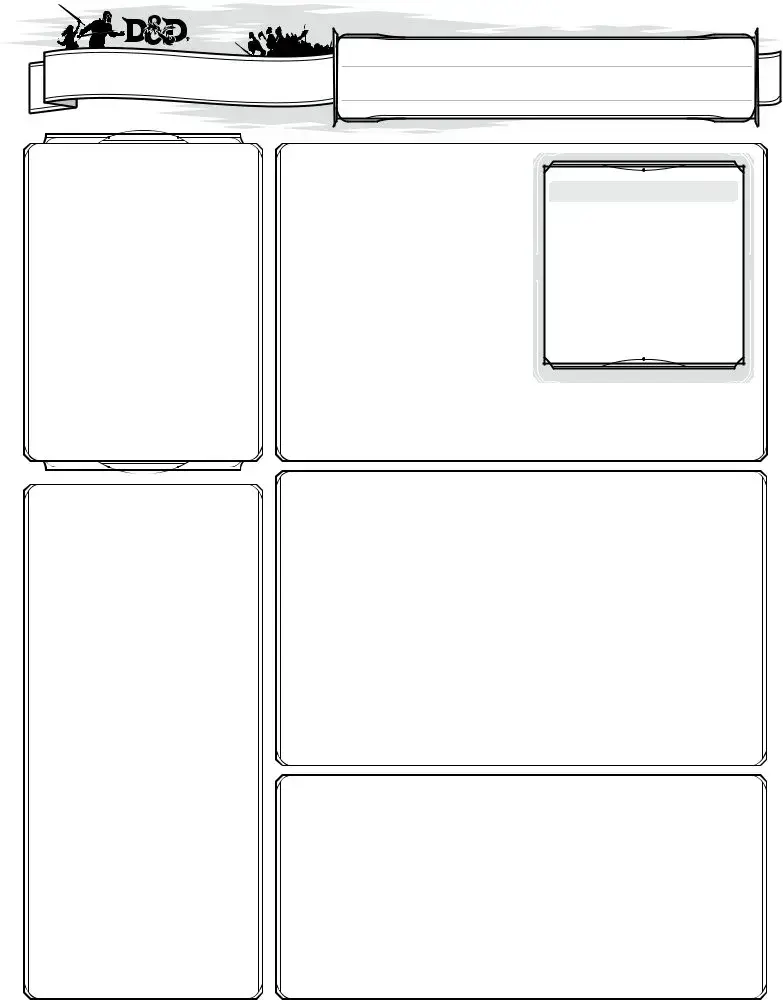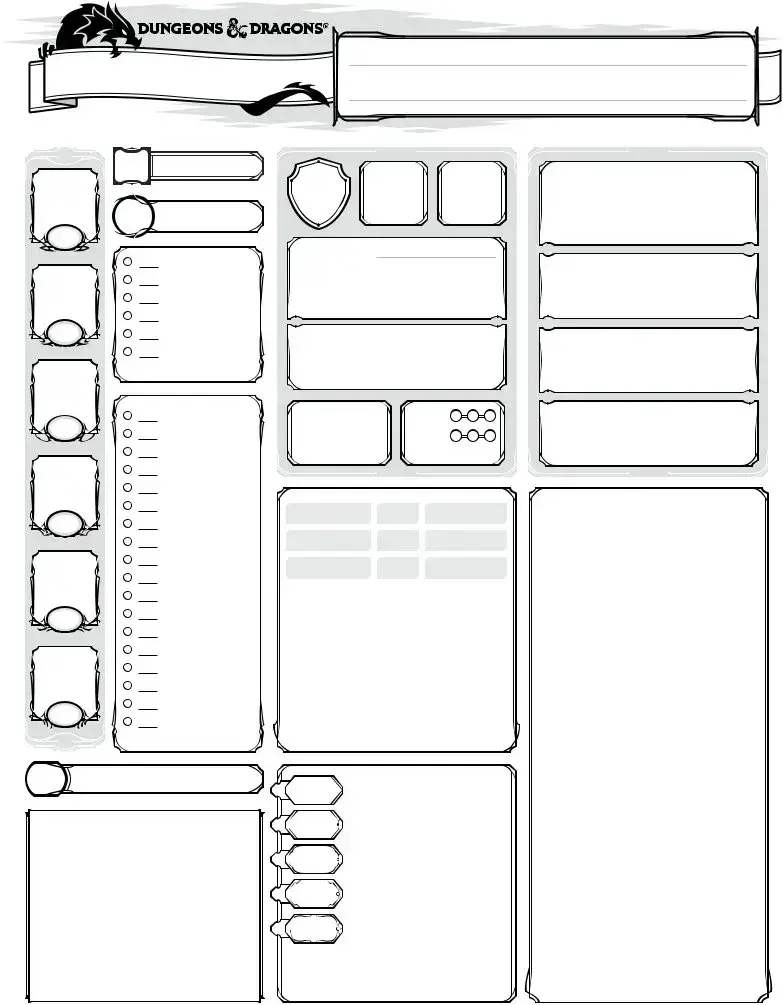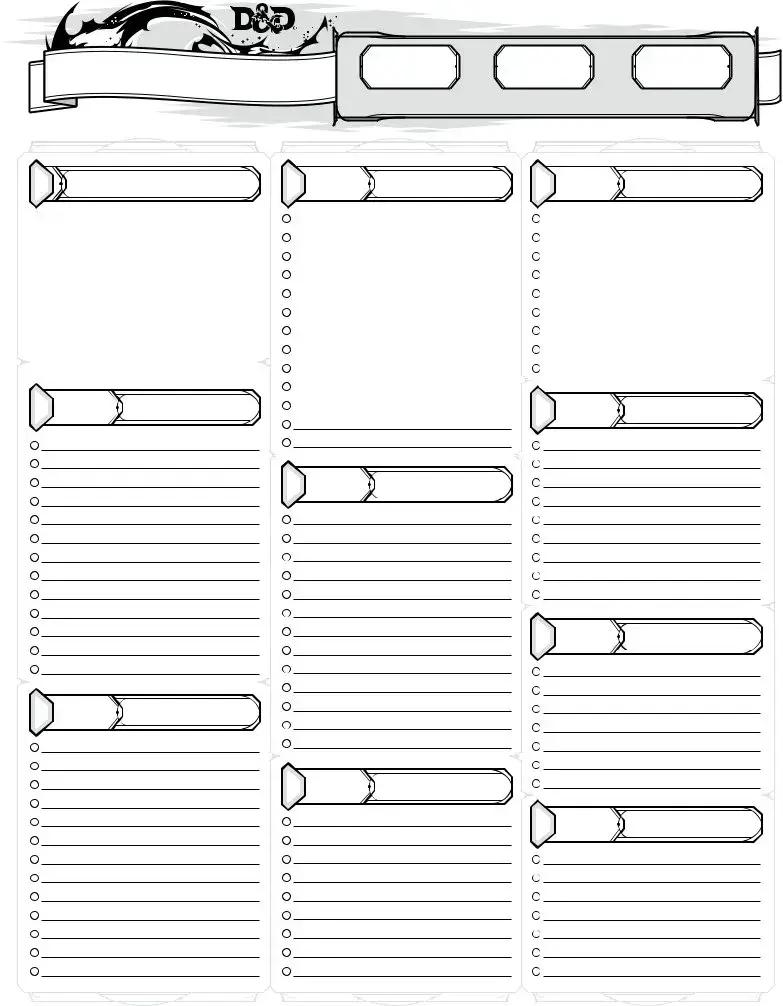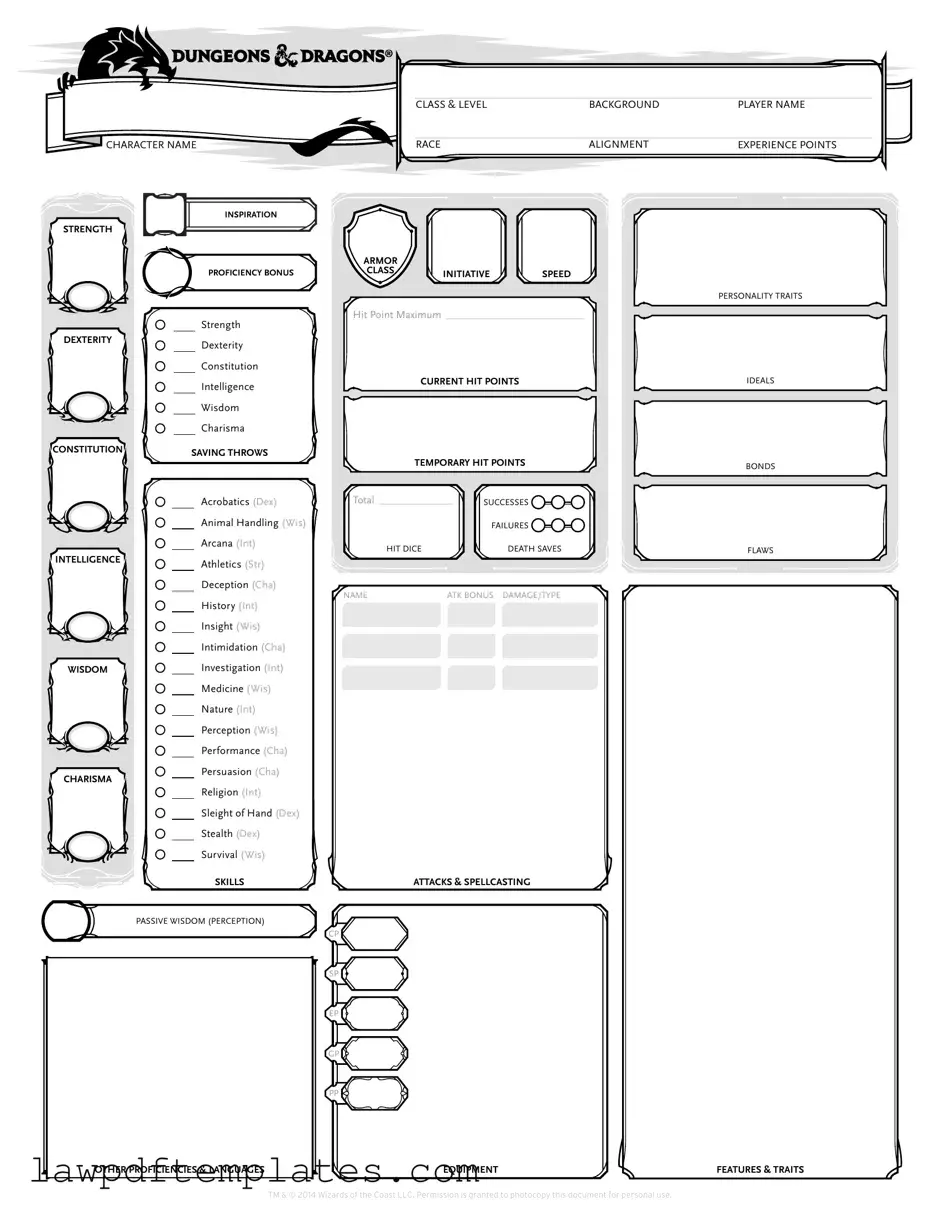Fillable Dnd Character Sheet Template
File Details
| Fact Name | Description |
|---|---|
| Character Basics | The character sheet includes essential details like name, race, and class. |
| Ability Scores | It lists six ability scores: Strength, Dexterity, Constitution, Intelligence, Wisdom, and Charisma. |
| Skills and Proficiencies | Players can track their skills and any proficiencies their character has. |
| Equipment | There is a section for listing weapons, armor, and other gear the character possesses. |
| Hit Points | The sheet includes a space for tracking hit points, which reflect the character's health. |
| Background Information | It allows players to note their character's background, personality traits, and ideals. |
Sample - Dnd Character Sheet Form

|
CLASS & LEVEL |
BACKGROUND |
PLAYER NAME |
CHARACTER NAME |
RACE |
ALIGNMENT |
EXPERIENCE POINTS |
INSPIRATION
STRENGTH
|
ARMOR |
|
|
PROFICIENCY BONUS |
CLASS |
INITIATIVE |
SPEED |
|
PERSONALITY TRAITS
DEXTERITY
CONSTITUTION
INTELLIGENCE
WISDOM
CHARISMA
Strength
Dexterity
Constitution
Intelligence
Wisdom
Charisma
SAVING THROWS
Acrobatics (Dex)
Animal Handling (Wis)
Arcana (Int)
Athletics (Str)
Deception (Cha)
History (Int)
Insight (Wis)
Intimidation (Cha)
Investigation (Int)
Medicine (Wis)
Nature (Int)
Perception (Wis)
Performance (Cha)
Persuasion (Cha)
Religion (Int)
Sleight of Hand (Dex)
Stealth (Dex)
Survival (Wis)
SKILLS
PASSIVE WISDOM (PERCEPTION)
Hit Point Maximum
CURRENT HIT POINTS
TEMPORARY HIT POINTS
Total |
|
|
SUCCESSES |
|
|
|
FAILURES |
|
HIT DICE |
|
DEATH SAVES |
NAME |
ATK BONUS DAMAGE/TYPE |
||
ATTACKS & SPELLCASTING
CP 
SP 
EP 
GP 
PP 
IDEALS
BONDS
FLAWS
OTHER PROFICIENCIES & LANGUAGES |
EQUIPMENT |
FEATURES & TRAITS |
TM & © 2014 Wizards of the Coast LLC. Permission is granted to photocopy this document for personal use.

|
AGE |
HEIGHT |
WEIGHT |
CHARACTER NAME |
EYES |
SKIN |
HAIR |
|
|
|
NAME |
SYMBOL
CHARACTER APPEARANCE |
ALLIES & ORGANIZATIONS |
ADDITIONAL FEATURES & TRAITS
CHARACTER BACKSTORY |
TREASURE |
TM & © 2014 Wizards of the Coast LLC. Permission is granted to photocopy this document for personal use.

SPELLCASTING |
SPELLCASTING |
SPELL SAVE DC |
SPELL ATTACK |
ABILITY |
|
BONUS |
|
CLASS |
|
|
|
0 |
CANTRIPS |
3 |
6 |
||
|
|
|
|
|
|
|
|
|
|
|
|
|
|
|
|
|
|
|
|
|
|
|
|
|
|
|
|
|
|
|
|
|
|
|
|
|
|
|
|
|
|
|
|
|
|
|
|
|
|
|
|
|
|
|
|
|
|
|
|
|
|
|
|
|
|
|
|
|
|
|
|
|
|
|
|
|
|
|
|
|
|
|
|
|
|
|
|
|
|
|
|
|
|
|
|
SPELL |
|
|
|
|
LEVEL SLOTS TOTAL |
SLOTS EXPENDED |
|||
1 |
|
|
7 |
|
|
||||
PAR |
|
E |
E |
PR |
D |
SPELL NAME
4
SPELLS KNOWN
8
2
5
9
TM & © 2014 Wizards of the Coast LLC. Permission is granted to photocopy this document for personal use.
Common mistakes
Creating a character for Dungeons & Dragons (D&D) is an exciting process, but it can also be overwhelming. Many players make common mistakes when filling out the D&D Character Sheet form. Awareness of these pitfalls can enhance your gaming experience and ensure your character is well-prepared for adventures.
One frequent error is neglecting to properly calculate ability scores. Players often overlook the importance of understanding how these scores impact gameplay. Each ability score affects various aspects of your character, such as combat and skill checks. Take the time to double-check your calculations and ensure they align with your character's background and class.
Another mistake is failing to consider the character's background. A well-rounded character should have a backstory that informs their skills and traits. Many players skip this step, resulting in characters that feel one-dimensional. Investing time in crafting a background can provide depth and motivation for your character’s actions during the game.
Players sometimes forget to include their character’s equipment and inventory. This oversight can lead to confusion during gameplay. Ensure you list all relevant items, including weapons, armor, and tools. Keeping track of your character's gear will help you stay organized and ready for any challenges that arise.
Additionally, some players misinterpret the rules regarding proficiency bonuses. Understanding how and when to apply these bonuses is crucial for effective gameplay. A character may have various skills and tools they are proficient in, and failing to apply these bonuses can lead to missed opportunities in critical situations.
Another common mistake is underestimating the importance of spells for spellcasting characters. Players often forget to list their available spells or miscalculate spell slots. This can severely limit a character’s effectiveness in combat and other scenarios. Be sure to review your character’s class features and ensure you have a clear understanding of your spellcasting abilities.
Moreover, some players neglect to update their character sheets after leveling up. As characters gain experience, they often acquire new abilities and features. Failing to reflect these changes on your character sheet can create inconsistencies and confusion during gameplay. Regularly review and update your sheet to keep it accurate.
Another mistake involves not paying attention to alignment and personality traits. These elements shape your character’s decisions and interactions with others. A character without a clear alignment may struggle to find their place within the party. Define your character's moral compass and how it influences their actions.
Lastly, players often overlook the importance of communication with their Dungeon Master (DM). Sharing your character's details and intentions with the DM can enhance the storytelling experience. A strong relationship with your DM can lead to richer narratives and more engaging gameplay. Don’t hesitate to reach out and discuss your character’s role in the campaign.
Common PDF Documents
Fedex Door Tag Authorizing Release - This form releases FedEx from liability for any issues with the delivery.
To facilitate a successful transaction, ensuring you have the correct form is crucial. For an effective guide to the Illinois Bill of Sale, explore our comprehensive information on the Illinois Bill of Sale form requirements.
Phone Insurance Claim - This form is essential for obtaining quick service from Asurion.
Profits or Loss From Business - Businesses with losses can report negative values on Schedule C, which can affect overall tax liabilities.
